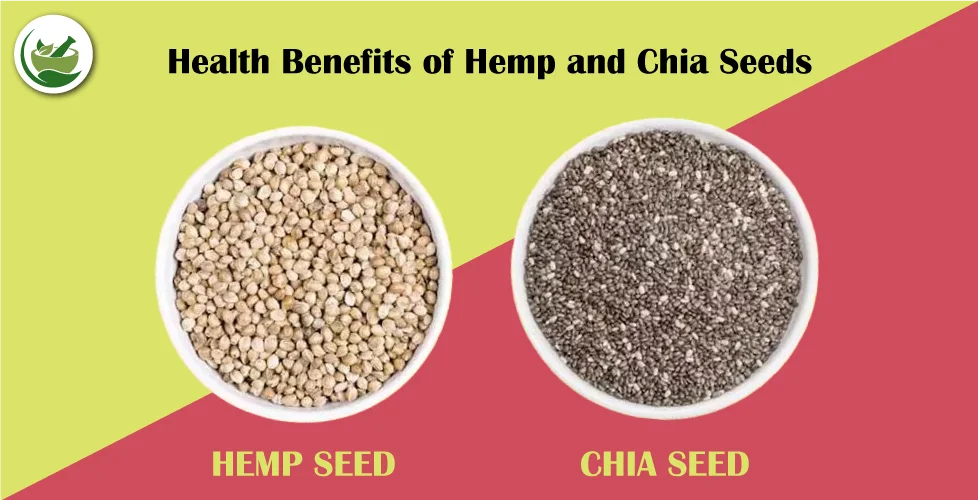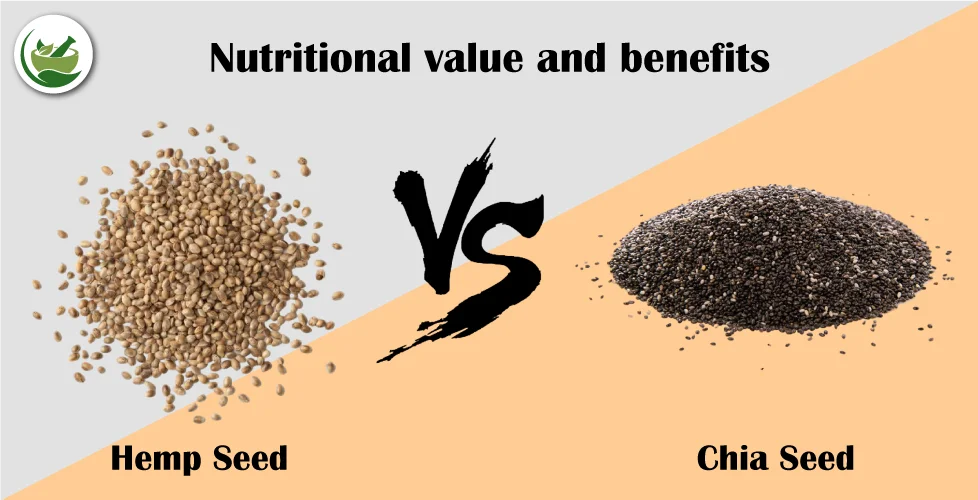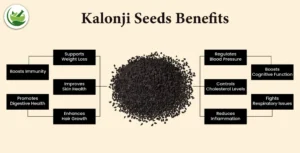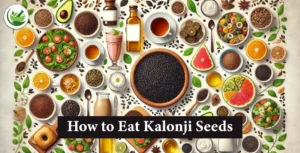
Superfoods, Benefits of Hemp and Chia Seeds, are pivotal in the pursuit of a healthier lifestyle due to their dense nutritional content, including essential fatty acids, proteins, and antioxidants. They excel in versatility and nutritional value, making them favourites among health enthusiasts.
This blog compares hemp and chia seeds(Salvia hispanica), highlighting their omega-3, antioxidants, and other health benefits. It’s perfect for both superfood enthusiasts and newcomers. Learn how these seeds can revolutionize your diet.
Nutritional Profile Overview
Hemp Seeds
It is known for their nutty flavor, hemp seeds are a powerhouse of nutrients. They are an excellent source of omega-3 and omega-6 fatty acids, which are essential for heart health and inflammatory responses. Additionally, hemp seeds offer a considerable amount of protein, with all nine essential amino acids, making them a complete protein source. They are also rich in fiber, which aids in digestion and promotes satiety. Minerals such as magnesium, potassium, and iron are abundantly found in hemp seeds, along with vitamins E and B.
Chia Seeds
Chia seeds are small but mighty, boasting an impressive array of nutrients. They are renowned for their high omega-3 fatty acid content, particularly alpha-linolenic acid (ALA), which supports cardiovascular health. Chia seeds are also an excellent source of fiber, contributing to digestive health and weight management. Like hemp seeds, they contain a variety of minerals, including calcium, magnesium, and phosphorus. Chia seeds are a good source of protein and antioxidants, which help fight oxidative stress.
Related blog The Seed Spectrum: A Deep Dive Into The Health Benefits Of Hemp Seeds Vs Chia Seeds
Omega-3 fatty acids
Omega-3 fatty acids are a crucial component of human cell membranes and have numerous health benefits, including reducing inflammation, lowering heart disease risk, and supporting brain health. Both hemp and chia seeds are excellent sources of these essential fats, but they differ in composition and the benefits they offer.
Hemp Seeds
Hemp seeds are rich in omega-6 and omega-3 fatty acids in a 3:1 ratio, which is considered optimal for human health. The omega-3s in hemp seeds are primarily alpha-linolenic acid (ALA), which can help reduce the risk of heart disease. Although ALA needs to be converted into EPA or DHA (more active forms of omega-3s in the body) to exert most of its benefits, hemp seeds’ omega-3 content still contributes significantly to cardiovascular health and reduces inflammation.
Chia Seeds
Chia seeds stand out for their exceptionally high omega-3 fatty acid content, mainly ALA. With a more substantial omega-3-to-omega-6 ratio, chia seeds are an excellent choice for boosting ALA intake. Research suggests that chia seeds’ omega-3s can help reduce inflammation, enhance cognitive performance, and lower risk factors for heart disease. Their omega-3 fatty acids can also contribute to improved skin health, showing a versatile range of benefits.
Antioxidants
Antioxidants are substances that can prevent or slow damage to cells caused by free radicals, thereby reducing oxidative stress and inflammation in the body. Both hemp and chia seeds contain antioxidants, though they vary in types and amounts.
Hemp Seeds
The antioxidants in hemp seeds include vitamin E and tocopherols, which can help protect the body’s cells from damage. Hemp seeds also contain phytosterols, compounds that have been shown to reduce cholesterol levels, further protecting heart health.
Chia Seeds
Chia seeds are particularly rich in antioxidants, including quercetin, kaempferol, and chlorogenic acid. These compounds have various health benefits, such as reducing inflammation, improving heart health, and potentially lowering cancer risk. The high antioxidant content of chia seeds also helps preserve the seeds’ fats, preventing them from going rancid and maintaining their nutritional profile.
Nutritional value and benefits

Fiber Content
Fiber plays a pivotal role in digestive health, weight management, and regulating blood sugar levels. Both hemp and chia seeds are excellent sources of fiber, offering unique benefits due to their distinct fiber content.
- Hemp Seeds
Hemp seeds are a good source of both soluble and insoluble fiber, although they contain less total fiber compared to chia seeds. Soluble fiber from hemp seeds can help regulate blood sugar levels and reduce cholesterol, while insoluble fiber aids in digestive health and can help prevent constipation. The fiber in hemp seeds also promotes a feeling of fullness, which can aid in weight management.
- Chia Seeds
Chia seeds are exceptionally high in fiber, with a remarkable ability to absorb water and expand in the stomach, leading to increased satiety and a slower absorption of food. This can be particularly beneficial for weight loss and managing hunger. The high fiber content also supports digestive health by promoting regular bowel movements and feeding beneficial gut bacteria. Additionally, the soluble fiber in chia seeds can help lower LDL cholesterol levels and stabilize blood sugar levels.
Protein Quality and Content
Protein is essential for building and repairing tissues, making enzymes and hormones, and supporting overall health. Both hemp and chia seeds are valuable plant-based protein sources, with differing amino acid profiles and benefits.
- Hemp Seeds
Hemp seeds are known for their high-quality protein, containing all nine essential amino acids, making them a complete protein source. This is relatively rare in plant-based foods, making hemp seeds an excellent protein option for vegetarians and vegans. The protein in hemp seeds is highly digestible and can support muscle repair, immune function, and overall health.
- Chia Seeds
While chia seeds also offer a good amount of protein and contain all nine essential amino acids, their protein content is slightly lower than that of hemp seeds. However, the protein they do provide is still beneficial for health, contributing to tissue growth and repair and supporting immune functions. Chia seeds can be a valuable part of a balanced diet, particularly for those seeking plant-based protein sources.
Other nutrients and health benefits
Beyond omega-3 fatty acids, antioxidants, fiber, and protein, hemp and chia seeds boast a variety of other nutrients that contribute to their health-promoting properties.
Hemp Seeds
- Minerals: Hemp seeds are a rich source of magnesium, a mineral essential for muscle relaxation, nerve function, and maintaining a healthy heartbeat. They also provide significant amounts of zinc and iron, which are crucial for immune function and oxygen transport, respectively.
- Vitamins: These seeds are a good source of B vitamins, particularly vitamin B1 (thiamine) and vitamin B6, which are important for energy metabolism and brain health.
Chia Seeds
- Calcium: Chia seeds are notable for their calcium content, which is vital for bone health and muscle function. They offer an alternative source of calcium for those who do not consume dairy products.
- Manganese and phosphorus: These minerals are abundant in chia seeds and play essential roles in bone health, metabolism, and tissue repair.
Hemp seeds are rich in essential fatty acids and protein, while chia seeds boast high fiber and mineral content. Including both in your diet enhances heart health, bone strength, and immune support with their wide nutrient spectrum.
Related blog The Ultimate Guide To Incorporating Flax, Chia, And Hemp Seeds Into Your Diet
Culinary Uses and Versatility
Hemp and chia seeds are not only nutritious but also incredibly versatile in the kitchen, making them easy to incorporate into daily diets.
Hemp Seeds:
- Texture and Flavor: With their nutty flavor, hemp seeds can be sprinkled over salads, blended into smoothies, or mixed into yogurt. They are also great for making hemp seed milk or adding to baked goods for a nutritional boost.
- Culinary Uses: Hemp seeds can be used in making hemp tofu as a protein-rich alternative to soy tofu, offering a different option for vegetarians and vegans.
Chia Seeds:
- Hydration Properties: Chia seeds can absorb up to 12 times their weight in liquid, forming a gel-like substance. This unique property makes them perfect for creating chia puddings, thickening smoothies, or as an egg substitute in vegan baking.
- Culinary Flexibility: Their mild flavor allows chia seeds to be added to a wide range of dishes, from breakfast cereals to energy bars, without altering the taste profile significantly.
Both hemp and chia seeds offer a plethora of culinary possibilities, from simple additions to recipes to being key ingredients in healthy, innovative dishes. Their nutritional value, combined with their versatility, makes them staples in the pantry of anyone looking to enhance their diet with superfoods.
Conclusion
Hemp and chia seeds, nature’s nutrient-packed superfoods, offer essential fatty acids, antioxidants, and proteins. Including both in your diet boosts heart health, digestion, bone strength, and more. Their versatility in the kitchen also means that enriching your diet with these seeds is both easy and delicious. Whether you’re sprinkling them over your morning yogurt, adding them to your smoothies, or incorporating them into your baking, hemp and chia seeds are a simple way to boost your nutritional intake and support your overall health.






